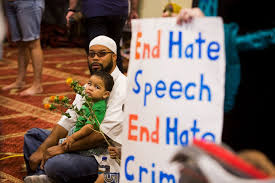On Friday night, June 13, two political assassinations took place in Minnesota by a man who violently angry about abortion and LGBTQ rights.
Vince Boelter’s assassinations have been officially labelled as hate crimes, but what about the hate speech that promotes violence? It turns out that hateful speech is perfectly legal in the United States, even when politicians engage in hate speech, as many do both here and abroad.
A substantial body of research and recent case studies demonstrate that hateful, inciteful rhetoric from politicians, bloggers, and public figures can foster an environment in which hate crimes are more likely to occur.
During his presidency and campaigns, Trump made repeated statements targeting Muslims, Hispanics, and other minorities. For instance, his anti-Muslim and anti-Hispanic remarks were widely shared and amplified, contributing to a documented 32% increase in hate crimes against Muslims and a significant, though smaller, increase against Hispanics. His use of the term “Chinese virus” at the onset of the COVID-19 pandemic was followed by a surge in anti-Asian sentiment and hate incidents, as tracked by organizations like StopAAPIhate.org.
On January 6, 2021, Trump’s speech urging supporters to “fight like hell” and march on the Capitol was cited by participants and critics as a catalyst for the ensuing riot, with some rioters claiming they were “awaiting direction” from him. Trump has repeatedly directed his hatred at various groups, including judges (who now need increased security), Democrats (“vermin”), and the media.
But Trump is not the only national leader to incite or encourage political violence. In India, politicians from the ruling Bharatiya Janata Party have used anti-Muslim rhetoric as part of electoral strategies, contributing to increased violence against Muslims. In Poland, President Andrzej Duda’s campaign demonized the LGBT community and foreigners, which correlated with a rise in targeted hostility. Extreme political rhetoric has been linked to outbreaks of mass violence, including civil wars and genocides, such as the role of anti-Tutsi broadcasts in Rwanda in the 1990s.
Many far-right websites often echo and magnify political leaders’ rhetoric, creating an echo chamber that reinforces animosity and signals to followers that extreme views are acceptable. This amplification can embolden individuals to act on their prejudices. Social media platforms have seen spikes in hate speech (e.g., “invasion” and “replacement” conspiracy theories), which correlate with increases in hate crimes, as seen in the aftermath of the El Paso Walmart shooting, where the perpetrator’s manifesto echoed such language.
In a popular sense, these politicians and bloggers and others are in some way “aiding and abetting” these acts of political violence. But hate speech itself is protected under the First Amendment of the US Constitution. Most speech that would be considered hate speech in other democracies is protected in the U.S. The government cannot regulate speech simply because it is offensive or hateful or may incite others to violence.
The Court has recognized narrow exceptions for “fighting words” (face-to-face insults likely to provoke immediate violence) and “true threats” (statements meant to communicate a serious intent to commit unlawful violence). However, these exceptions are interpreted very narrowly, and most hate speech does not meet these criteria
In Brandenburg v. Ohio (1969), the Court established that speech—no matter how hateful—cannot be prohibited unless it is “directed to inciting or producing imminent lawless action and is likely to incite or produce such action.” This “imminent danger” test remains central to when speech can be limited. While Donald Trump encouraged January 6 “patriots” to go to the US Capitol and “fight like hell,” his words may have met the Brandenburg test, but efforts to hold him accountable fell short late in President Biden’s term when the Supreme Court ruled that “official acts” of a President could not be criminally prosecuted.
https://www.politico.com/news/2024/08/09/supreme-court-trump-immunity-muddle-00173375
Trump’s election in November of 2024 meant that the Department of Justice would soon be in the hands of Trump loyalists. Indeed, he appointed Pam Bondi as US Attorney General, and the case was promptly dropped. If you wonder whether partisanship had anything to do with the dismissal, please read:
The link between hateful political rhetoric and political violence is clear enough; but unless there is incitement to “imminent lawless action,” the atmospherics of hateful political rhetoric do not amount to legally actionable “aiding and abetting.” Hate speech can add plenty of fuel to the violent actions of angry and hateful citizens, but it’s all perfectly legal.
